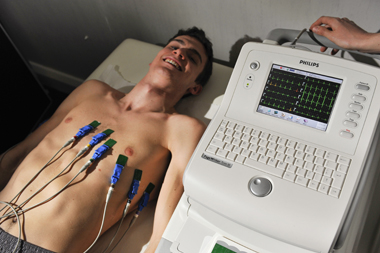Electrocardiograms
(ECG) have become a routine part of pre-participation physical exams at the
collegiate level. The thought behind the use of ECGs is to screen for cardiac
adaptations that may lead to sudden cardiac death. Is this practice something
that should be implemented for high-school aged athletes as well? Specific
considerations should be addressed in the discussion of this topic. For
example, who will pay for the follow-up tests, will physicians be given
guidelines on abnormal ECG findings, what type of physician should be reading
the ECGs, how can false-positive tests be minimized, and will everyone be given
an ECG or just those considered to be at high risk?
Budgets at the
high-school level are rarely comparable to those at the NCAA Division 1 level,
so most likely, the student-athletes would be responsible for the costs associated
with the ECG. According to the 2009 Medicare Physician Fee Schedule, the average
cost of an ECG is $371. According
to research, data predicts that 16% of ECG readings would be read as
positive for a cardiac abnormality; however, only 1.3% of that 16% would
actually have the abnormality. This leaves a large majority of student-athletes
spending money on follow-up costs.
Cardiac
abnormalities are often classified as training-induced or pathological which
points to the need for physicians to be up-to-date on reading ECGs. Specifically,
physicians and exercise physiologist should work together to create ECG guidelines
on what is training-induced versus abnormal readings. Also, it could be
beneficial to require physicians that are specifically trained in cardiac
abnormalities to read the athletes’ ECGs. For example, a cardiologist would be
much better practiced at reading ECGs than an orthopedic doctor.
Since research has shown
that black males are at the highest risk for cardiac abnormalities, perhaps the
ECG screening could be limited to this population. In addition to black males,
anyone who has a history indicative of a cardiac abnormality, as defined by the
American Heart Association, should also be required to have an ECG prior to
participation in athletics.
Athletic trainers
need to be educated about the importance of a thorough PPE in order to protect
our athletes and do everything in our power to prevent sudden cardiac death.
Athletic trainers are in the unique position where we can implement screening
tools at the school and also encourage our team physicians to be current on
abnormal ECG guidelines.

Thank you for sharing such wonderful information!
ReplyDeleteRegards,
Nursing in Australia